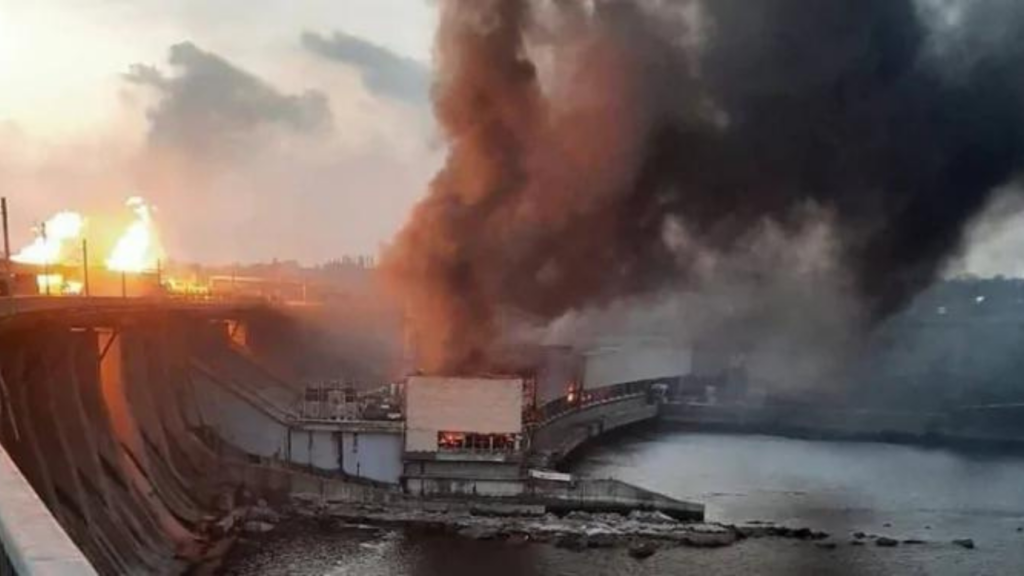Urgent appeal of the Ukraine 5 AM Coalition regarding the mass shelling of Ukraine’s critical infrastructure on March 22, 2024

On the night of March 22, 2024, Russia launched massive missile attacks on Ukraine’s critical civilian (primarily energy) infrastructure facilities, which led to the destruction of civilian objects. Today, Kharkiv, Zaporizhzhia, Dnipro, Kryvyi Rih, Cherkasy, multiple cities and towns in Kharkiv, Dnipro, Zaporizhzhia, Odesa, Khmelnytskyi, Vinnytsia, and Ivano-Frankivsk oblasts were under attack. It followed a massive attack on Kyiv and the Kyiv region the day before.
It is currently difficult to assess the full impact of the March 22 attack, but as of 2 PM Kyiv time, direct hits were reported at the Dnipro hydroelectric power plant in Zaporizhzhia. An attack on a hydroelectric power plant dam could lead to catastrophic consequences for the lives of Ukrainians and the environment. Oil products leaked into the Dnipro River, which could also cause significant damage to the ecosystem. Along with the attack on the Kakhovka dam, such actions by the Russian Federation can amount to a use of weapons of mass destruction.
As a result of the morning attack, the external overhead line connecting the temporarily occupied Zaporizhzhia Nuclear Power Plant to the unified energy system of Ukraine was disconnected, putting the plant on the verge of blackout. A particularly difficult situation is currently in Kharkiv, where the Russian army attempted to destroy the main energy facilities that supply the city, directing at least 15 strikes at such objects. According to the Kharkiv Regional Military Administration, about 700,000 consumers in Kharkiv are currently without electricity.
Hundreds of thousands of people across Ukraine remain without power, water and heat. These attacks have claimed the lives of at least five people, including a child. 30 people are injured, residential buildings and civilian facilities are destroyed.
This is not the first time that Russia has targeted Ukraine’s civilian energy infrastructure, but today’s attack has already been assessed as one of the most widespread and destructive since the beginning of Russia’s large-scale aggression against Ukraine. The targeted attacks hit key facilities that ensure the operation of the power system as a whole: power generation, high-voltage substations, and distribution operator substations. Emergency power outages have already been introduced in seven regions of Ukraine. Critical infrastructure elements, such as medical facilities, emergency call systems for critical services (e.g. police, hospitals, etc.), train stations, water and heat supply, are affected.
Attacks against civilian objects (8(2)(b)(ii)), causing excessive harm to civilians and damage to civilian objects (8(2)(b)(iv)) constitute war crimes and crimes against humanity (7(1)(k)) as per the Rome Statute of the International Criminal Court (ICC). Earlier, on March 5, II Pre-Trial Chamber of the Court issued arrest warrants against two representatives of the Russian military command for attacks on civilian infrastructure, including the Kremenchuk hydroelectric power plant.
We call on the Government of Ukraine to provide the investigative and prosecutorial authorities with the appropriate legislative tools to document all violations in a proper manner and in accordance with international criminal law standards. In particular, without further delay, to ratify the Rome Statute of the ICC and implement it in the criminal and criminal procedure codes; ensure proper protection and support at the state level for victims and witnesses of mass shelling. Effective documentation of war crimes and crimes against humanity in accordance with international standards is a key responsibility of Ukraine’s law enforcement agencies.
We hope that the Office of the Prosecutor of the ICC will add the episodes of mass shelling of critical infrastructure on March 22, 2024 to the scope of its ongoing investigation, and expand the range of suspects to include the highest political level officials as those responsible for implementing a systematic and consistent policy of destroying Ukraine’s critical civilian infrastructure.
We call on our partner countries to step up their efforts to provide air defense systems to ensure the protection of civilians and objects protected by international humanitarian law.







